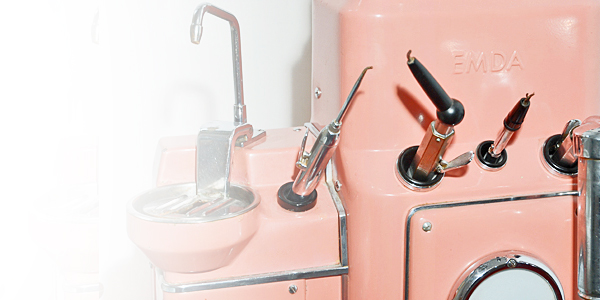
Implants – the modern tooth replacement solution
Implantology is one of the great dental innovations of recent decades. The underlying principle of anchoring one or more artificial tooth roots in the jaw has some major advantages. Implants are suitable for a wide variety of gap scenarios, from missing single teeth to jaws without teeth. And they are implemented without grinding down healthy teeth (as is usually necessary to attach a bridge), and without bone loss in the jaw (as can occur with permanently missing tooth roots).
Implants are small pins or screws made of titanium (sometimes also of ceramic). They are installed in the jaw by the implantologist, where they fuse with the surrounding tissue over the course of several months. This process is called osseointegration. Once completed, implants are almost as resilient as natural tooth roots. Unlike these, however, implants offer a threaded mount – meaning, if necessary, that the dental crown they support can be removed and replaced.
Following professionally-performed implantation, the tooth replacement is virtually indistinguishable from a natural tooth, either visually or functionally. For the patient fitted with implants, it feels like their own teeth. This results in a greater increase in quality of life compared with other solutions. However, it is important that the surgical procedure is carried out by experienced and competent professionals, such as those you will find in our practice in Tempelhof.
Reliable for decades
Even though implants – like the dentures fixed to them – cannot naturally become diseased, they still require careful looking after. Even for a jaw that has been completely restored with implants, this still applies. Otherwise peri-implantitis can occur. This is an inflammation of the implant bed, which in extreme cases can lead to the loss of the implant. Thorough oral hygiene at home and regular check-ups should therefore be a matter of course. Provided this is the case, implants will reliably perform their function for decades and are therefore a worthwhile investment. This also applies to older patients, who often have problems with dentures. As long as the patient’s general health permits a minor surgical intervention, there is nothing to be said against implant therapy – including for older people.
The general prerequisite for implant therapy is that there is sufficient jawbone to safely accommodate the implants. This is both in terms of height and thickness. In many patients this is not (or is no longer) the case, usually due to osteoporosis (bone loss) or mechanical causes such as denture pressure or permanent ‘crooked bite’. Before implants can be facilitated for these patients, bone augmentation is required. Either the patient’s own bone tissue or an artificial bone substitute is inserted and fixed in place using a membrane or titanium nails and screws. The need for any healing depends on the type of augmentation. In addition, the oral cavity should be free from inflammation when the implants are installed. Otherwise the risk of peri-implantitis increases considerably. Therefore, gingival or periodontal inflammation must be treated in advance (known as denture rehabilitation). Patients with diabetes should have their medication adjusted appropriately to prevent inflammation. If you are taking psychotropic drugs, antibiotics, cytostatics or bisphosphonates – or if you suffer from a blood disorder such as anaemia or haemophilia – it is essential that you inform us before the start of implant therapy so that complications can be ruled out as much as possible. The same applies to cardiovascular and connective tissue diseases.
If you have any further questions about implants, we will be happy to answer them.
